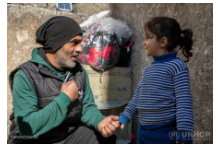An offensive by armed groups on 27 November 2024 led to the overthrow of the former government on 8 December, sparking hopes for an end to the world’s largest displacement crisis alongside uncertainty over the country’s immediate future.
Before these dramatic events, over 13 million people remained displaced inside Syria and in neighbouring countries following more than 13 years of crisis.
UNHCR remains on the ground in Syria and is committed to staying and delivering. In areas where the security situation is stable, UNHCR is resuming activities to reach those in most need.
Across Syria, as part of the inter-agency response, UNHCR is tracking displacement, identifying the number and locations of displaced people, assessing needs in hosting centres and delivering essential support, including food, water, dignity kits, household items and in-kind medical assistance.
UNHCR-supported community centres have reopened in Aleppo city and continue to offer assistance in other areas, providing health services, counselling and case management activities, as well as referring individuals in need to available food, relief items and other humanitarian support within the community.
We also continue to provide life-saving humanitarian aid for Syrian refugees in neighbouring countries, helping the most vulnerable with cash for medicine and other basic necessities, stoves and fuel for heating, insulation for tents, thermal blankets and winter clothing.
